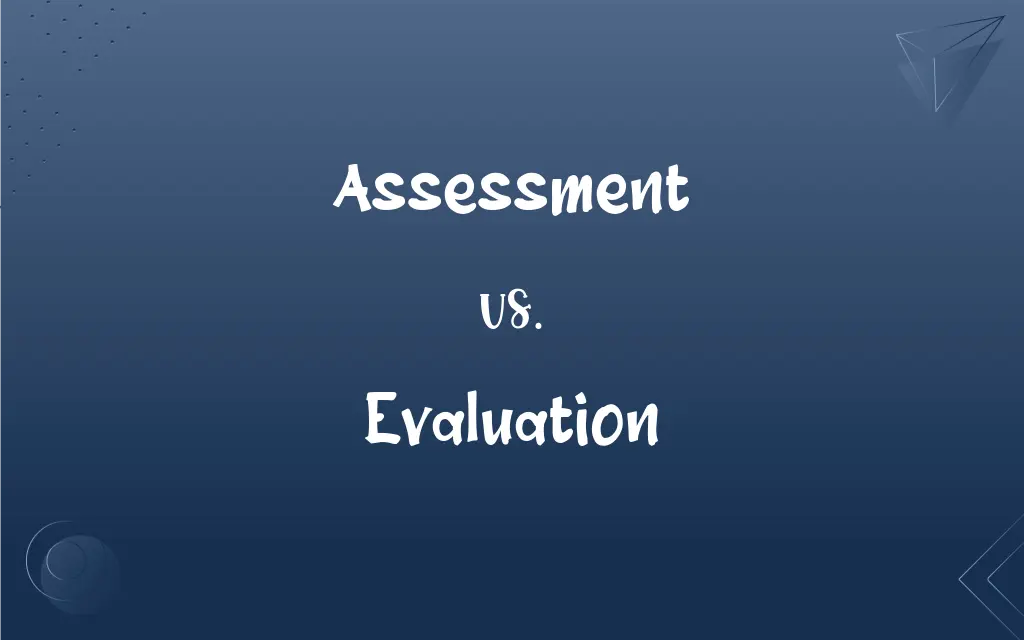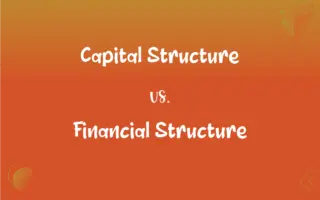Assessment vs. Evaluation: What's the Difference?
Edited by Aimie Carlson || By Harlon Moss || Published on November 13, 2023
Assessment is the process of gathering information to understand and improve; evaluation is judging the value or worth based on that information.

Key Differences
Assessment involves collecting data to understand a subject, while evaluation involves analyzing that data to make judgments. The goal of assessment is to gather information, while the goal of evaluation is to make informed decisions. Assessment focuses on the process, while evaluation focuses on the outcome. Assessment is continuous and ongoing, while evaluation is often conducted at specific points in time.
In assessment, the emphasis is on understanding and improvement, whereas evaluation emphasizes judgment and decision-making. Assessments are typically formative, conducted during the process, while evaluations are summative, conducted at the end of a process. Assessment helps identify strengths and weaknesses, while evaluation helps determine the overall value or success. Assessments often involve qualitative data, while evaluations often involve quantitative data.
Assessments are often used in educational settings to understand student learning, while evaluations are used to determine the effectiveness of educational programs. Assessment data is used to inform instruction and improve learning outcomes, while evaluation data is used to make decisions about programmatic changes. Assessments are typically conducted by educators or practitioners, while evaluations may be conducted by external evaluators or stakeholders.
Comparison Chart
Purpose
Gather information
Make judgments
Focus
Process
Outcome
ADVERTISEMENT
Timing
Ongoing, formative
Specific points, summative
Data Type
Often qualitative
Often quantitative
Setting
Common in education
Common in program evaluation
Assessment and Evaluation Definitions
Assessment
Collection of data to improve outcomes.
The assessment revealed areas for improvement.
Evaluation
Measurement of success or failure.
The evaluation showed the project was successful.
ADVERTISEMENT
Assessment
Process of gathering information to understand a subject.
The teacher used assessment to gauge student understanding.
Evaluation
Analysis of information to make informed decisions.
The evaluation revealed the need for changes.
Assessment
Evaluation of performance based on criteria.
The assessment was based on specific learning objectives.
Evaluation
Judging the value or worth based on data.
The evaluation determined the program's effectiveness.
Assessment
Measurement of progress over time.
The assessment showed significant improvement.
Evaluation
Determination of overall quality.
The evaluation rated the product as high quality.
Assessment
Determination of strengths and weaknesses.
The assessment highlighted the student's strengths.
Evaluation
Comparison against set standards or criteria.
The evaluation used specific criteria for judgment.
Assessment
The act of assessing; appraisal.
Evaluation
To ascertain or fix the value or amount of
Evaluate the damage from the flood.
Assessment
An amount assessed, as for taxation.
Evaluation
To determine the importance, effectiveness, or worth of; assess
Evaluate teacher performance.
Assessment
The act of assessing or an amount (of tax, levy or duty etc) assessed.
FAQs
Can evaluation be used for assessment?
Evaluation may include assessment data, but the focus is on making judgments.
Can assessment be used for evaluation?
Yes, assessment data can be used as part of the evaluation process.
What is assessment?
Assessment is the process of gathering information to understand a subject or improve outcomes.
Who typically conducts assessments?
Assessments are typically conducted by educators or practitioners.
What is evaluation?
Evaluation is the process of judging the value or worth of something based on data.
How do assessment and evaluation differ?
Assessment focuses on gathering information and understanding, while evaluation focuses on judgment and decision-making.
Can evaluation be ongoing?
Evaluation can be ongoing, but it is often summative and conducted at specific points in time.
What is the role of criteria in assessment?
Criteria in assessment are used to evaluate performance and determine progress.
Can evaluations be qualitative?
Evaluations can include qualitative data, but they often involve quantitative data.
What is the purpose of assessment in education?
The purpose of assessment in education is to understand student learning and improve outcomes.
What is the purpose of evaluation in program evaluation?
The purpose of evaluation in program evaluation is to determine the effectiveness of a program.
What are common settings for assessment?
Assessment is common in educational settings to understand student learning.
What are common settings for evaluation?
Evaluation is common in program evaluation to determine effectiveness.
What types of data are used in assessment?
Assessment often involves qualitative data.
Who typically conducts evaluations?
Evaluations are often conducted by external evaluators or stakeholders.
What is the relationship between assessment and improvement?
Assessment data is used to inform instruction and improve learning outcomes.
What types of data are used in evaluation?
Evaluation often involves quantitative data.
Can assessment be ongoing?
Yes, assessment is often ongoing and formative.
What is the role of criteria in evaluation?
Criteria in evaluation are used to make judgments and determine overall value or quality.
Can assessments be quantitative?
Assessments can include quantitative data, but they often involve qualitative data.
About Author
Written by
Harlon MossHarlon is a seasoned quality moderator and accomplished content writer for Difference Wiki. An alumnus of the prestigious University of California, he earned his degree in Computer Science. Leveraging his academic background, Harlon brings a meticulous and informed perspective to his work, ensuring content accuracy and excellence.
Edited by
Aimie CarlsonAimie Carlson, holding a master's degree in English literature, is a fervent English language enthusiast. She lends her writing talents to Difference Wiki, a prominent website that specializes in comparisons, offering readers insightful analyses that both captivate and inform.































































